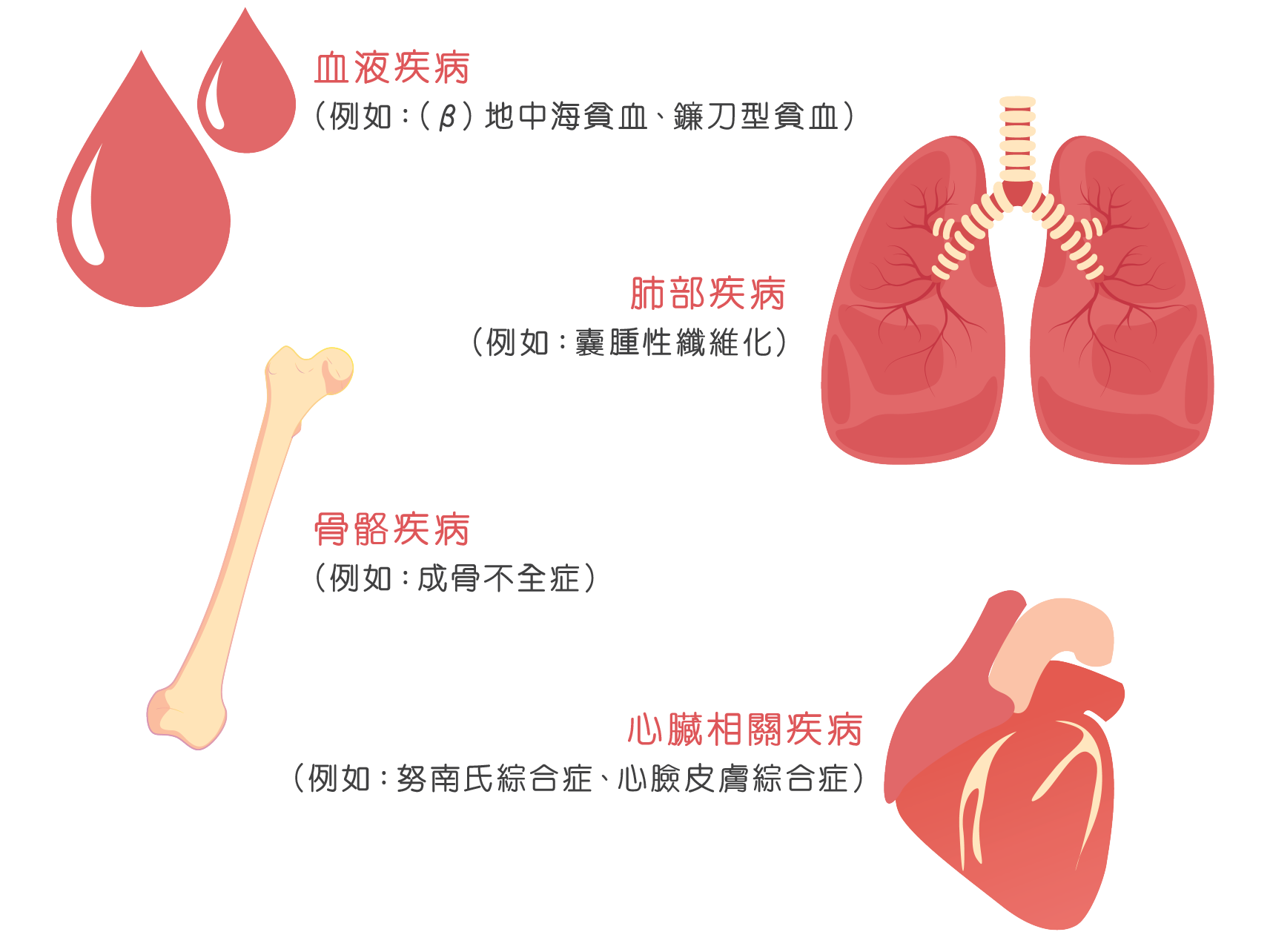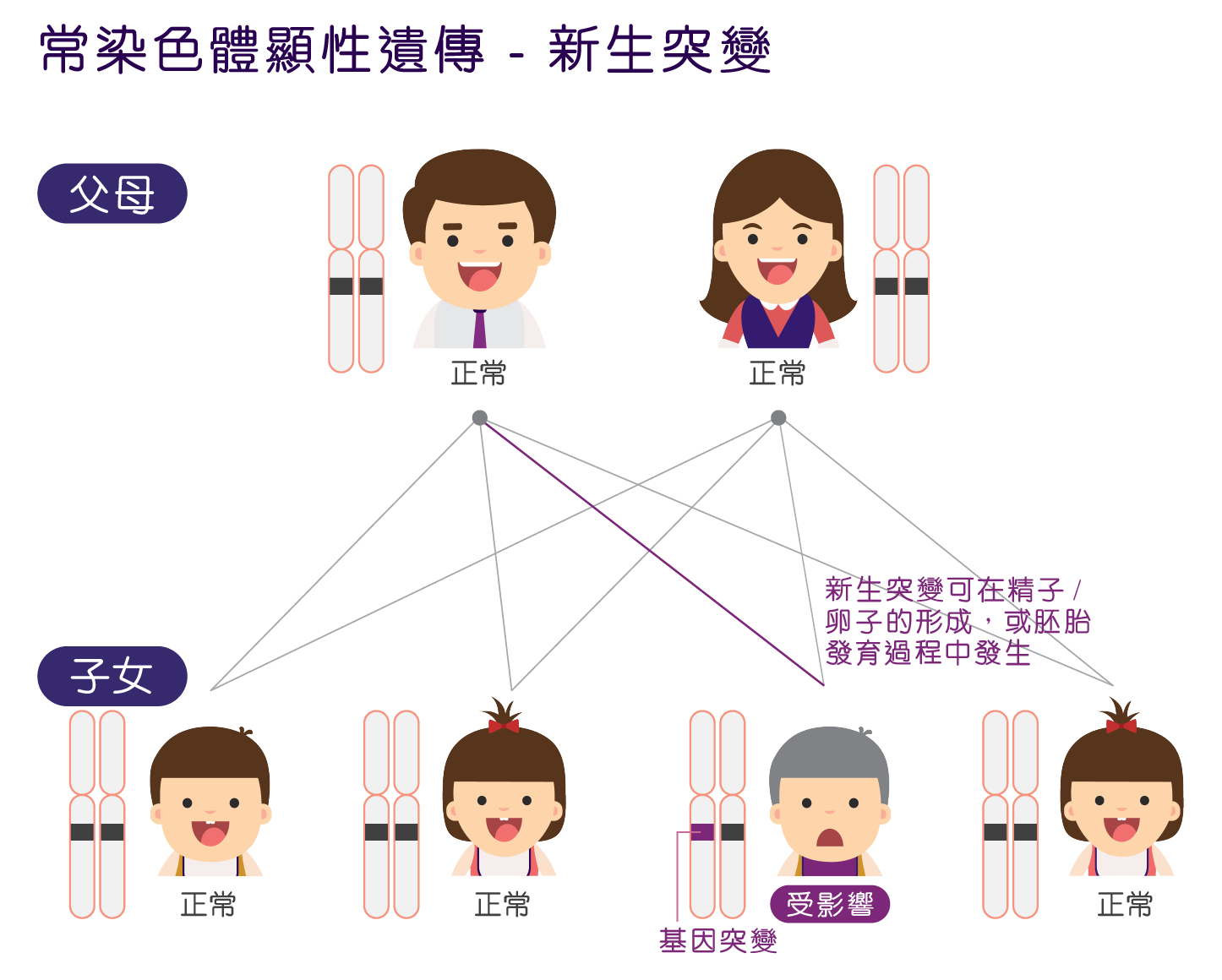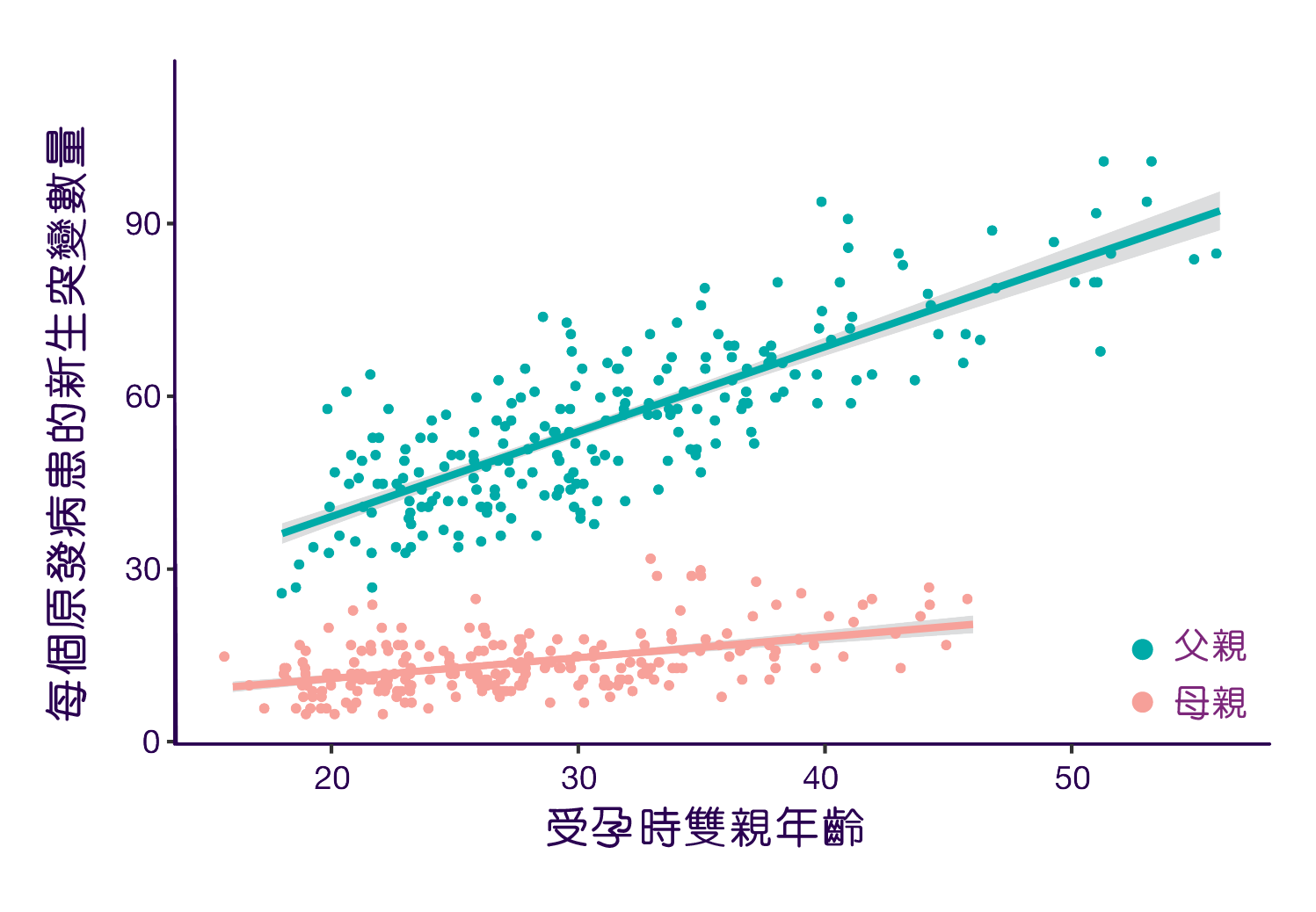Non-invasive Prenatal Monogenic Disorder Test (DS1/2/3)Back
Checking 5 common inherited recessive genetic disorders, and 44 severe genetic disorders due to de novo mutations
What are Monogenic Disorders?
Monogenic disorders are genetic diseases caused by mutations in a single gene. The gene mutations screened by this test belong to severe genetic diseases.
Example of monogenic disorders

What causes single-gene mutations?
Gene mutations can be inherited from either parent who may be a carrier or a patient of a genetic disorder. However, new mutations not carried by either parent can also arise during egg/sperm formation or embryonic development (so-called de novo mutations).
Although the occurrence of each disease caused by new mutations covered by this test is relatively rare, the total incidence (one in 600) is similar to the incidence of Down syndrome.

Chance of mutation increases with advancing paternal age
More and more studies have found a correlation between advanced paternal age and increased risk of monogenic disorder due to de novo mutations. The number of these mutations increases with paternal age, particularly when the father reaches 40 or above. These mutations typically arise during spermatogenesis. As a man ages, the chance of these errors to occur increases substantially.

Current NIPT screening cannot fully reveal fetal conditions
Abnormal fetal conditions could be missed by current prenatal screening. Many disorders are not typically associated with abnormal prenatal ultrasound findings (especially in the first trimester), or may not be evident until late second / third trimester, when confirmatory invasive testing can pose a risk of preterm birth, or after delivery.
Current NIPT screens for conditions typically associated with advanced maternal age (e.g. Down syndrome), but not those associated with advanced paternal age, which can also pose potential risks to fetal health.
Why DiagCor?
DiagCor offers a brand-new type of non-invasive prenatal test (NIPT)^, screening 29 genes for mutations causing 49 severe genetic disorders in the fetus. Combined with the current NIPT, it ensures a more comprehensive screen for couple of advanced age (>40 years old).
Test features
Cover 49 types of Monogenic Disorder:
- Free diagnostic test for abnormal results
- Genetic counselling available upon request
- Maternal blood sample (10 ml) collected at 10+ weeks of gestation and paternal swab sample required
- Report delivered in 3 weeks
^Powered by Genoma laboratory

Checking 5 common inherited recessive genetic disorders, and 44 severe genetic disorders due to de novo mutations
What are Monogenic Disorders?
Monogenic disorders are genetic diseases caused by mutations in a single gene. The gene mutations screened by this test belong to severe genetic diseases.
Example of monogenic disorders

What causes single-gene mutations?
Gene mutations can be inherited from either parent who may be a carrier or a patient of a genetic disorder. However, new mutations not carried by either parent can also arise during egg/sperm formation or embryonic development (so-called de novo mutations).
Although the occurrence of each disease caused by new mutations covered by this test is relatively rare, the total incidence (one in 600) is similar to the incidence of Down syndrome.

Chance of mutation increases with advancing paternal age
More and more studies have found a correlation between advanced paternal age and increased risk of monogenic disorder due to de novo mutations. The number of these mutations increases with paternal age, particularly when the father reaches 40 or above. These mutations typically arise during spermatogenesis. As a man ages, the chance of these errors to occur increases substantially.

Current NIPT screening cannot fully reveal fetal conditions
Abnormal fetal conditions could be missed by current prenatal screening. Many disorders are not typically associated with abnormal prenatal ultrasound findings (especially in the first trimester), or may not be evident until late second / third trimester, when confirmatory invasive testing can pose a risk of preterm birth, or after delivery.
Current NIPT screens for conditions typically associated with advanced maternal age (e.g. Down syndrome), but not those associated with advanced paternal age, which can also pose potential risks to fetal health.
Why DiagCor?
DiagCor offers a brand-new type of non-invasive prenatal test (NIPT)^, screening 29 genes for mutations causing 49 severe genetic disorders in the fetus. Combined with the current NIPT, it ensures a more comprehensive screen for couple of advanced age (>40 years old).
Test features
Cover 49 types of Monogenic Disorder:
- Free diagnostic test for abnormal results
- Genetic counselling available upon request
- Maternal blood sample (10 ml) collected at 10+ weeks of gestation and paternal swab sample required
- Report delivered in 3 weeks
^Powered by Genoma laboratory
Service Procedure Q&A
Service Procedure
PART 1 : Contact your physician or your clinic
PART 2 : Draw sample from the clinic
PART 3 : Receive Report
PART 4 : Once the report is ready, the clinic will inform you to collect your report. If you need report counselling service, please contact the clinic.
Q&A
QWhen is the suitable time for expected mother to do the test?
10 weeks pregnant or above (subject to ultrasound examination)
QUnder what circumstances can this genetic test not be done?
If the subject has undergone organ transplantation, they cannot accept this test. (DiagCor will not accept this sample for testing)
QDo I need an empty stomach before taking the test?
No special preparation is required, no fasting.
QWhen will clients receive the report for the test?
In about 18 working days after DiagCor receive all the samples.



